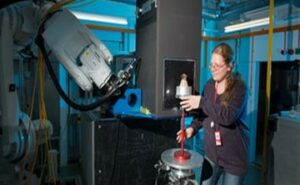ISIS@MACH (Materials Characterisation Hub), created by the University of Rome ‘Tor Vergata’ Centro Fermi and the Lazio Region of Italy is a new Research Infrastructure operating as a hub of ISIS, including access to neutron and muon instruments
By: Shibl Gill, 30 September 2020

This week has seen the first experiments being run at ISIS under the new access programme. These include work by Prof Mauro Rubini, Director of Anthropological Services and Professor in Archeoanthropology at Foggia University, and colleagues. They are using ISIS to study bones from a II Century AD Roman sepulchral site in order to learn more about the changes they have undergone, including whether any underwent burning.
Prof Rubini says, “Neutrons shed new light on combusted bones from two sarcophagi identified as Aebutia Quarta and Carvilius Gemellus in the extraordinary ancient Roman sepulchral site of “Hypogeum of the Garlands” (Grottaferrata, Rome)”
Dr Giulia Festa, also part of the same experiment team, adds, “Neutrons give a unique insight into the burned bones’ history as well as new information about burial and cooking practices, and the environment in which they were found.”
A second experiment, by Dr Gabriele Croci from Università degli Studi di Milano-Bicocca and Ing. Marco Martellucci (Mardel s.r.l.), is exploring the possibility of using neutrons at ISIS to image iron rods in reinforced concrete to look for failure mechanisms, and concrete with varying barite concentrations as a candidate for shielding of radiological facilities.
Prof Carla Andreani from University of Rome Tor Vergata is co-ordinating the proposal submission process. “We are delighted that first experiments through ISIS@MACH-Neutron Gate have now been run at ISIS”, she remarked. “We are looking forward to a wide variety of new science over the next few years – this is a great opportunity for Lazio and Italian scientists, and a great way to continue our partnership with ISIS”.
A series of further experiments is planned over coming months as part of the ISIS@MACH programme.
Further information on ISIS@MACH can be found here. The programme represents a continuation of the long-standing collaboration between ISIS and University of Rome Tor Vergata.
